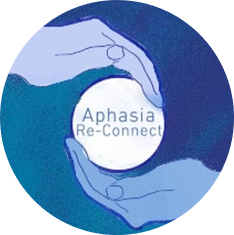What is aphasia?
Aphasia is a communication disability
- It occurs when the communication centres of the brain are damaged
- Often caused by stroke
- It can also arise from brain haemorrhage, head injury or tumours
- There is also a condition called Primary Progressive Aphasia
- This is a progressive communication disability with cognitive decline
How common is aphasia?
Aphasia is more common than you would think
- Every five minutes someone in the UK has a stroke.
- The Stroke Association says there are approximately 152,000 strokes in the UK every year. About a third of those people will have aphasia.
- There are also people who acquire aphasia through other conditions.
What does having aphasia mean?
- Each person with aphasia experiences it differently. It affects communication:
- Getting the message in (following conversation or reading information), and
- Getting the message out (speech and writing).
- Some people cannot speak at all
- some people just have a few words
- Others can no longer read, write or use numbers
How does living with aphasia affect everyday life?
With aphasia, everyday activities such as:
- Having a conversation
- Answering the phone
- Watching television
can suddenly become a source of profound frustration and anxiety.
This is true both for the person with aphasia and for their families, friends and carers.Communication helps us to be a person and to take part in life and all its opportunities.
It can turn life upside down, with a profound impact on every aspect of life.
People with aphasia may find it difficult to:
- take part in conversation
- say what they think or need, or
- say their name or names of their family.
It can be difficult to talk in a group or noisy environment, or to read a book, follow the TV or radio.
How might living with aphasia affect mental well-being?
While no two people experience aphasia in the same way, it can make people feel:
- depressed
- anxious
- lonely or
- embarrassed
The frustration of knowing what you want to say but struggling to say it, can lead to anger.
How might it affect friends and family?
Friends and family of someone with aphasia may find it hard to:
- understand what the person is saying
- adapt to the way that they communicate
- resist finishing sentences, or
- keep the conversation going.
To find out more about living with aphasia, take a look at the Aphasia Information Pack, posted here, and to read more, visit our Resources page
Aphasia Awareness Poster
Download our Aphasia Awareness Poster, designed by our Journal Club to display in your setting.



